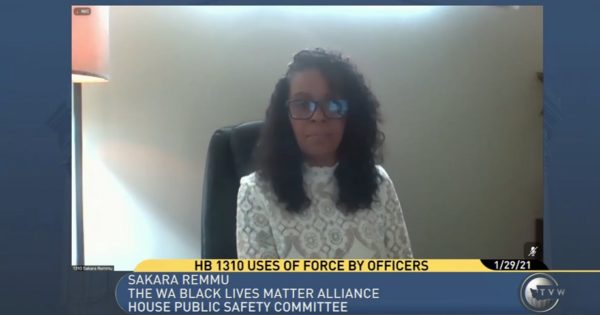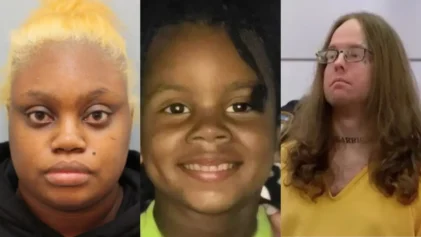When most people envision strides in the civil rights movement, Atlanta, Montgomery, Birmingham, Selma and other Southern cities come to mind. But the Pacific Northwest is emerging as a powerhouse that may set legislative precedents. Bills introduced this session may take the next step in equality after eliminating “whites only” water fountains and opening electoral access to Blacks.
One of the most compelling pieces of legislation could keep police officers from being bystanders to bad behavior from their colleagues. Senate Bill 5066 would require any police officer who witnesses another officer engaging or attempting to engage in excessive force to intervene and try to stop it, or risk suspension or decertification.
Washington state has never decertified an officer for using excessive force, according to a report from The Seattle Times.
Sponsored by Democratic state Sen. Manka Dhingra, Senate Bill 5066 will have automatic consequences and remove ambiguity and second-guessing after the deaths of people of color at the hands of police.
Dhingra said the bill was partially inspired by the killing of George Floyd at the hands of Minneapolis police in May, where “we saw officers standing around and not intervening.”
Police brutality was also a factor, she added, referencing local cases such as the killing of Manuel Ellis, who died on March 3, 2020, in handcuffs while being restrained by Tacoma police. Officials said two Tacoma police officers asked Ellis if he needed help and when the officer stepped out of the car to talk, Ellis allegedly assaulted the officer, leading to the restraint. The coroner’s report ruled Ellis’ death a homicide.
“We have to empower the officers who hold themselves up to a high ethical standard by requiring the training, policies and procedures they need to do the right thing. We need to change the culture that allows bad actors in law enforcement to get away with their behavior,” she told Atlanta Black Star. “We have been working closely with communities who have been suffering violence at the hands of the police, as well as with our law enforcement officers. These measures will help keep communities safe by holding officers to the high standards that Washingtonians expect and deserve.”
New Bills Aimed at Strengthening Blacks Were Decades in the Making
Although nationwide incidents sparked the Black Lives Matter movement, activist Sakara Remmu, who was a founding member of the Washington Black Lives Matter Alliance, said this change has been a long time coming.
“Black Lives Matter Seattle King County was started in 2017 in a library in the town, which is Black Seattle, our community. And it was really the next generation that came to me and said, ‘We want to start a chapter that is focused on policy.’ Because if we don’t make the connect from the streets to the laws then we’re going to be exterminated as a people one way or another,” she said in a discussion with Atlanta Black Star.
Remmu explained that the whole of Black life is dying on the vine.
“It’s not just that we are being murdered, but in every aspect of our lives, the whole of Black life, we do not thrive.”
She has testified before several state legislative committees stressing the need for across-the-board changes in police tactics, education funding, housing discrimination, foster care system and many other aspects of Black life.

“We started calls to action … before the session,” she said, adding that there are 150-plus bills circulating. Just about every Washington state lawmaker is involved — even with the COVID-19 pandemic changing the way things are done.
All the bills have been recently introduced. They are currently being discussed in committees. Cutoff day for new bills is Feb. 15, even if the legislature is carried over into a special session. With that in mind, BLM has narrowed down its list of priorities for this round with an eye to the future.
“We are the recipients of the Jim Crow legacy of the North,” she said. “And a lot of people think it doesn’t exist up here. They think it’s a utopia.”
During the Great Migration when Blacks left farming jobs in the South for factories in northern cities, Seattle was one of those destinations. Subsequently, the racism followed. Black lives have been taken in Washington state at high rates. Between 2016 and 2020, about 23 percent of deaths by police were Black. But Blacks make up about 7 percent of the population, according to an analysis by The Seattle Times.
Voices from All Races Have Banded Together to Change Laws In Washington State That Discriminate Against Blacks
“The march that we had last year touched over 444 million people around the world. And we did a day of action online action that day, with 85,000 people in the street,” said Remmu, adding, “We have a mandate from the people to change the laws of Washington state, because they bought into [the need] and they immediately donated money, and we didn’t even ask for money.”
Her hope is that with time these new laws will impact the rest of the nation and become federal mandates. She added that “wokeness” without the muscle of legal recourse means almost nothing.
The BLMSKC call to action brought about donations not just from concerned Black citizens, but from local and multi-national businesses, as well as huge nonprofits.
“We didn’t even really ask for money,” said Remmu. “We asked for resources … [but the people responded with] giving money explicitly to Black-led organizations or organizations that are seriously doing anti-racism work, because our communities are in crisis.”
The donations ensure there will be lobbyists and other advocates for turning the tide of racial discrimination and implicit bias in government interactions with Blacks.
“We have somebody at the table who can really seriously negotiate in good faith on behalf of the big things that needed to happen,” she said. “We can actually be a real player, we can actually build a government relations team, we can actually do the forward work that is required to get into a legislative session and be a player.”
Budget Process Could ‘Suck All of the Air’ Out of Legislative Process
There’s no way to know if any of these bills will move far enough ahead in the legislative process to actually become law, T.M. Sell, a professor of political economy at Highline College in King County, Washington, told Atlanta Black Star.
This being a budget-writing year for the Washington State Legislature could be a boon or a bust for the new bills.
“The Legislature writes a biennial budget and then a supplemental budget in the other years. The budget process this year is complicated by pandemic-related economic impacts,” said Sell. “Although we are a relatively wealthy state, our antiquated tax structure doesn’t keep pace with the demands for public spending. We have no income or capital gains tax, and so are overly dependent on the sales tax. As that tax is not applied to food or medicine, it is very susceptible to ups and downs in the economy, so the budget process is complicated by the state being several billion dollars short of expected revenue.”
So the budget tends to “suck a lot of the air out of the room,” he said.
“And any bill with a fiscal note — which means it has a budget impact — faces a much less certain future.”
But the longer session may give non-budget bills a better chance with more opportunity to work on legislation.
Keeping politics out of the process, Sell said some of the bills may survive into the short session next year.
Washington state legislative bills involving police matters:
SB 5051/HB 1082 would provide timely and effective enforcement of state standards for law enforcement officers, allowing the Criminal Justice Training Commission to discipline officers who abuse the privilege of carrying a badge and gun.
SB 5066 would establish clear standards for police officers to intervene when fellow officers use force unjustly and to report any wrongdoing by fellow officers.
SB 5259/HB 1092 would establish comprehensive statewide reporting and publication for use-of-force incidents involving law enforcement.
HB 1054 would ban the use of chokeholds, neck restraints, unleashed police dogs, no-knock warrants, military equipment, and the practice of officers intentionally concealing their badges.
SB 5089 would increase minimum age and education requirements for new police officers.
SB 5263 would modify a 1986 law that has prevented people who have been killed or injured by police from recovering damages from police departments.
SB 5055 improves transparency, professionalism and equity of the arbitration process for law enforcement collective bargaining.
SB 5067/HB 1088 would shed light on officers who are not credible witnesses because of their previous conduct.
SB 5069/HB 1089 would bring transparency to investigations into police uses of deadly force.
HB 1267 would mandate the independent investigation of deadly uses of force, custodial deaths, and other officer-involved incidents.
BLMSKC Top Ten Washington state legislative bills
1. HB 1310 – Concerning permissible uses of force by law enforcement and correctional
officers.
2. HB 1267 – Concerning investigation of potential criminal conduct arising from police use of force, including custodial injuries, and other officer-involved incidents.
3. HB 1054 – Establishing requirements for tactics and equipment used by peace officers.
4. SB 5066 – Concerning a peace officer’s duty to intervene.
5. SB 5135 – Concerning unlawfully summoning a police officer.
6. SB 5051 – Concerning state oversight and accountability of peace officers and corrections officers.
7. SB 5151 – Concerning foster care and child care licensing by the department of children, youth, and families.
8. SB 5160 – Addressing landlord-tenant relations by providing certain tenant protections during and after public health emergencies, providing for legal representation in eviction cases, and authorizing landlord access to state rental assistance programs.
9. HB 1342 – Eliminating lunch co-pays for students who qualify for reduced-price lunches.
10. HB 1119 – Notifying students of courses with low-cost instructional materials and open educational resources at the four-year institutions of higher education.


